|
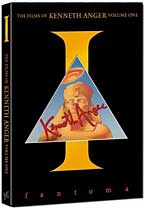
The
Films of Kenneth Anger
Volume One
Fantoma Films,
1947-1954
Director/Screenplay:
Kenneth Anger
Unrated, 88 minutes
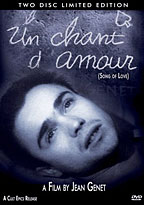
Un
Chant D'Amour
Cult Epics, 1950
Director/Screenplay:
Jean Genet
Unrated, 25 minutes
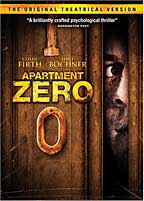
Apartment
Zero
Anchor Bay
Entertainment, 1989
Director: Martin
Donovan
Screenplay:
Martin Donovan, David Koepp
Starring:
Colin Firth, Hart Bochner, Dora Bryan, Liz Smith, Fabrizio Bentivoglio,
James Telfer, Mirella D'Angelo, Juan Vitali
Rated R, 124 minutes
|
More
From The Vaults
by Michael D. Klemm
Reprinted
from Outcome, May, 2007
The first months
of 2007 have been a goldmine for gay film historians. My own personal
wish list of films unavailable on DVD has just gotten considerably shorter
with these major new releases.
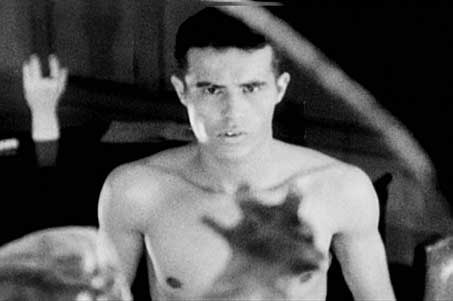
First up is The
Films of Kenneth Anger, Volume One. Anger, one of the best
known 20th century underground filmmakers, was one of the true pioneers
of queer cinema. Also known for penning the definitive book on Tinseltown
excess, Hollywood Babylon, he was a child actor in A Midsummer
Night's Dream (1935) and one of his films starred a member of the
Manson family. His influence can be seen in David Lynch's films and in
countless MTV videos. This wonderful collection contains Fireworks
(1947), Puce Moment (1949), Rabbit's Moon (1950), Eaux
d'artifice (1951) and Inauguration of the Pleasure Dome (1954).
This review will
examine the 1947 short, Fireworks,
which Anger filmed when he was 17 years old (by some reports, he was really
19). Considering his age, the film is remarkably sophisticated. In the
tradition of Luis Bunuel and Salvador Dali's 1929 silent Surrealist short,
Un Chien Andalou, and Jean Cocteau's 1930 The Blood of the Poet,
Fireworks is the cinematic equivalent
of a dream.
|
|
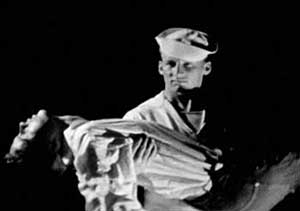 Fireworks
opens with a Pieta - a virile sailor carries a young man, played by Anger
himself. The young man awakes in his bed. What appears at first to be
a (very large) erection under the sheets is playfully revealed to be a
totem statue. Shirtless, he strides about the room and then slowly dresses
to go out. He cruises a sailor who strips off his shirt and flexes his
impressive muscles in extended close-ups. When Anger asks him to light
his cigarette, the sailor punches him. Chased by a gang of sailors, he
is beaten mercilessly. In a nod to Dali, his chest is ripped open to reveal
a ticking clock. A cleansing torrent of milk, obviously meant to represent
an orgasmic release, cascades down his bloody face in close-up. Naked,
he comes back to life in a public restroom. The virile sailor returns
and unbuttons his fly to reveal a roman candle which shoots fireworks
in all directions. Fireworks
opens with a Pieta - a virile sailor carries a young man, played by Anger
himself. The young man awakes in his bed. What appears at first to be
a (very large) erection under the sheets is playfully revealed to be a
totem statue. Shirtless, he strides about the room and then slowly dresses
to go out. He cruises a sailor who strips off his shirt and flexes his
impressive muscles in extended close-ups. When Anger asks him to light
his cigarette, the sailor punches him. Chased by a gang of sailors, he
is beaten mercilessly. In a nod to Dali, his chest is ripped open to reveal
a ticking clock. A cleansing torrent of milk, obviously meant to represent
an orgasmic release, cascades down his bloody face in close-up. Naked,
he comes back to life in a public restroom. The virile sailor returns
and unbuttons his fly to reveal a roman candle which shoots fireworks
in all directions.
|
|
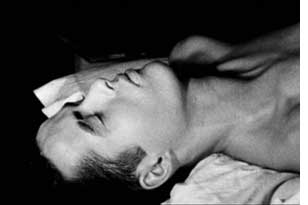 This
only scratches the surface of the homoerotic imagery and symbolism. Vito
Russo, in The Celluloid Closet, wrote that Anger had committed
his own "wet dream" to celluloid. But this 15 minute dream is
also a nightmare, one that could only sprout from the mind of a young
gay man coming of age in the 1940s. Self loathing breeds sado-masochistic
fantasy and the era's moral watchdogs would say the hero gets what he
deserves. But Anger has the last laugh - the dreamer awakens and his nightstand
sculpture - a hand that was missing a finger - has its absent digit restored
and pointing erect in the film's last shot. This
only scratches the surface of the homoerotic imagery and symbolism. Vito
Russo, in The Celluloid Closet, wrote that Anger had committed
his own "wet dream" to celluloid. But this 15 minute dream is
also a nightmare, one that could only sprout from the mind of a young
gay man coming of age in the 1940s. Self loathing breeds sado-masochistic
fantasy and the era's moral watchdogs would say the hero gets what he
deserves. But Anger has the last laugh - the dreamer awakens and his nightstand
sculpture - a hand that was missing a finger - has its absent digit restored
and pointing erect in the film's last shot.
|
|
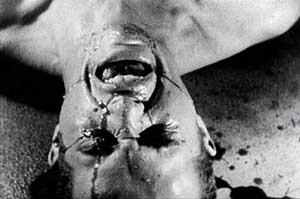 Even
today, Fireworks' images are
still startling. Just think how closeted gay men reacted to it in 1947!
I first saw it almost 30 years ago on PBS when I was just coming out to
myself and I felt as if I had just been struck by lightning. Initially
shown only at private screenings, and busted more than once for obscenity,
its reputation on the underground circuit quickly grew. Two of its first
champions were gay director James Whale (The
Bride of Frankenstein) and sex researcher Alfred Kinsey, who bought
a print of the film for his Institute. Jean Cocteau was impressed enough
to invite Anger to Paris, where he would film Rabbit's Moon. Even
today, Fireworks' images are
still startling. Just think how closeted gay men reacted to it in 1947!
I first saw it almost 30 years ago on PBS when I was just coming out to
myself and I felt as if I had just been struck by lightning. Initially
shown only at private screenings, and busted more than once for obscenity,
its reputation on the underground circuit quickly grew. Two of its first
champions were gay director James Whale (The
Bride of Frankenstein) and sex researcher Alfred Kinsey, who bought
a print of the film for his Institute. Jean Cocteau was impressed enough
to invite Anger to Paris, where he would film Rabbit's Moon.
|
|
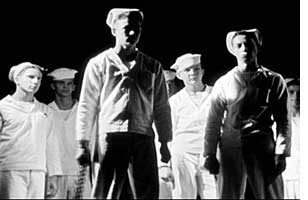 Anger's
films aren't for everyone but Fireworks is
a must for anyone with an interest in our past. His films are unique,
and it will be a pleasure to see a restored print of his homoerotic biker
epic Scorpio Rising (1963) when volume two comes out. The DVD is
nicely boxed with a 48 page booklet of extensive restoration and historical
notes, an introduction by Martin Scorsese, storyboards by Anger, and a
lengthy diary excerpt from writer Anais Nin, who appears in Inauguration
of the Pleasure Dome. Anger, himself, provides a commentary for each
film. Anger's
films aren't for everyone but Fireworks is
a must for anyone with an interest in our past. His films are unique,
and it will be a pleasure to see a restored print of his homoerotic biker
epic Scorpio Rising (1963) when volume two comes out. The DVD is
nicely boxed with a 48 page booklet of extensive restoration and historical
notes, an introduction by Martin Scorsese, storyboards by Anger, and a
lengthy diary excerpt from writer Anais Nin, who appears in Inauguration
of the Pleasure Dome. Anger, himself, provides a commentary for each
film.
|
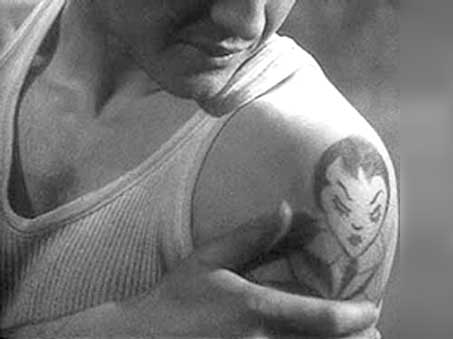 |
|
1950's Un
Chant d'Amour (Song of Love), is the only film to be directed
by out author Jean Genet. A contemporary of both Jean Paul Sartre and
Jean Cocteau, Genet is the author of Our Lady of the Flowers, A Thief's
Journal and Querelle; all written
in the 1940s and all explicitly gay.
|
|
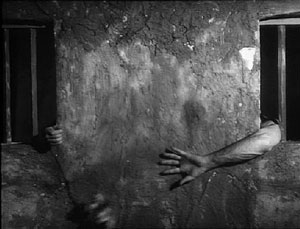 Most
of his books were autobiographical fiction populated by prostitutes, thieves
and murderers. His novels explode with descriptions of both tenderness
and rough sex between men. Our Lady of the Flowers was famously
written in prison and Cocteau was instrumental in getting the author pardoned.
Sartre was so taken by his work that he wrote Saint Genet, Actor and
Martyr. Genet's books, originally printed privately, were published
in France in the 1950s but were banned as obscene in the U.S. until the
1960s. They are still heavy reading even today Most
of his books were autobiographical fiction populated by prostitutes, thieves
and murderers. His novels explode with descriptions of both tenderness
and rough sex between men. Our Lady of the Flowers was famously
written in prison and Cocteau was instrumental in getting the author pardoned.
Sartre was so taken by his work that he wrote Saint Genet, Actor and
Martyr. Genet's books, originally printed privately, were published
in France in the 1950s but were banned as obscene in the U.S. until the
1960s. They are still heavy reading even today
|
|
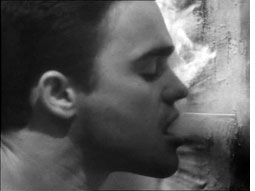 Also
the object of many obscenity trials, his short film Un
Chant d'Amour is a lyrical yet sexually explicit tome about
lonely prisoners in heat. A rugged. 40-ish man rubs against a wall desperate
for human contact with the man in the next cell. A younger man hugs the
exotic tattoo on his shoulder as he sashays about the room. Through a
hole in the wall, they blow cigarette smoke into each other's mouths.
A voyeuristic guard, patrolling the corridors, looks through a peephole
into each cell and watches several prisoners masturbate. Though plainly
aroused by what he sees, he enters the cell of the older man, beats him
and forces him to fellate his gun. The prisoner escapes into fantasies
where he and the man in the next cell make love in the woods. Also
the object of many obscenity trials, his short film Un
Chant d'Amour is a lyrical yet sexually explicit tome about
lonely prisoners in heat. A rugged. 40-ish man rubs against a wall desperate
for human contact with the man in the next cell. A younger man hugs the
exotic tattoo on his shoulder as he sashays about the room. Through a
hole in the wall, they blow cigarette smoke into each other's mouths.
A voyeuristic guard, patrolling the corridors, looks through a peephole
into each cell and watches several prisoners masturbate. Though plainly
aroused by what he sees, he enters the cell of the older man, beats him
and forces him to fellate his gun. The prisoner escapes into fantasies
where he and the man in the next cell make love in the woods.
|
|
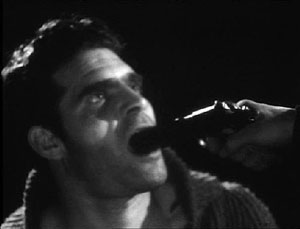 This
short description hardly does this remarkable film justice. Like Anger's
movie, sexuality explodes into violence but it is also one of the most
poetic and sensual films about men loving men ever filmed. Some might
call it porn, but you feel the loneliness as the camera lingers, almost
lovingly, on these men. They just seem to want some contact. The
older man kisses the wall as tears stream down his unshaven face, the
younger one hugs himself on his cot, both men open their mouths wide to
receive the sensuous smoke through a phallic straw stuck through the small
"glory hole." Two hands reach from between the bars of their
cell windows and try to touch. These are the images we had to imagine
while reading Our Lady of the Flowers. They will resonate again
decades later in Fassbinder's film of Genet's Querelle
(1982), Todd Hayne's Poison (1992) and even on HBO's Oz
. This
short description hardly does this remarkable film justice. Like Anger's
movie, sexuality explodes into violence but it is also one of the most
poetic and sensual films about men loving men ever filmed. Some might
call it porn, but you feel the loneliness as the camera lingers, almost
lovingly, on these men. They just seem to want some contact. The
older man kisses the wall as tears stream down his unshaven face, the
younger one hugs himself on his cot, both men open their mouths wide to
receive the sensuous smoke through a phallic straw stuck through the small
"glory hole." Two hands reach from between the bars of their
cell windows and try to touch. These are the images we had to imagine
while reading Our Lady of the Flowers. They will resonate again
decades later in Fassbinder's film of Genet's Querelle
(1982), Todd Hayne's Poison (1992) and even on HBO's Oz
.
Regretfully, the
print of the film on this disc shows no signs of restoration, but I'm
just thankful to finally be able to see this underground classic. The
disc also contains a commentary from Kenneth Anger, an introduction by
underground film presenter Jonas Mekas (who first smuggled the film into
the U.S.), and two interviews with Genet as an old man. One big complaint:
Genet's film is only 25 minutes long and all of the interviews could easily
have fit with the short film on one disc, instead it's spread across two
discs inflating the price for no reason. My special edition of James Cameron's
The Abyss has both versions of the long film on one disc!
|
|
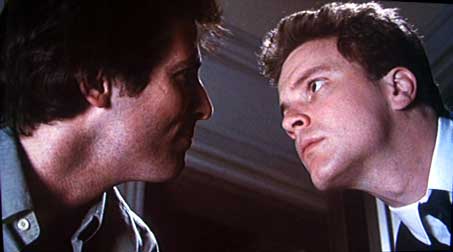
Last but not least
is the long awaited DVD release of Martin Donavon's 1989 Apartment
Zero. I have written about this film twice before in Outcome
so I will not review it fully again. (Click
here for the full review). Briefly, it is a terrific thriller about
two men who share a Buenos Aires apartment and one of them is a killer.
Colin Firth plays Adrian LeDuc, a paranoid closet case who runs an old
movie theater and Hart Bochner is his boarder, Jack Carney, who looks
- to Adrian - like James Dean come to life. The sexual tension between
Adrian and Jack anchors this brilliant character study which blends Roman
Polanski with Pedro
Almodovar. It would be a crime to say anything more about the plot,
except to note that the conclusion is one of the most disturbing in modern
cinema.
The disc restores
6 minutes of footage cut for some reason from the VHS release, sports
a nice letterboxed transfer and includes a commentary from the director
as well as a second by co-writer David Koepp with special guest Steven
Soderbergh.
More On Jean Genet:
Querelle
|


